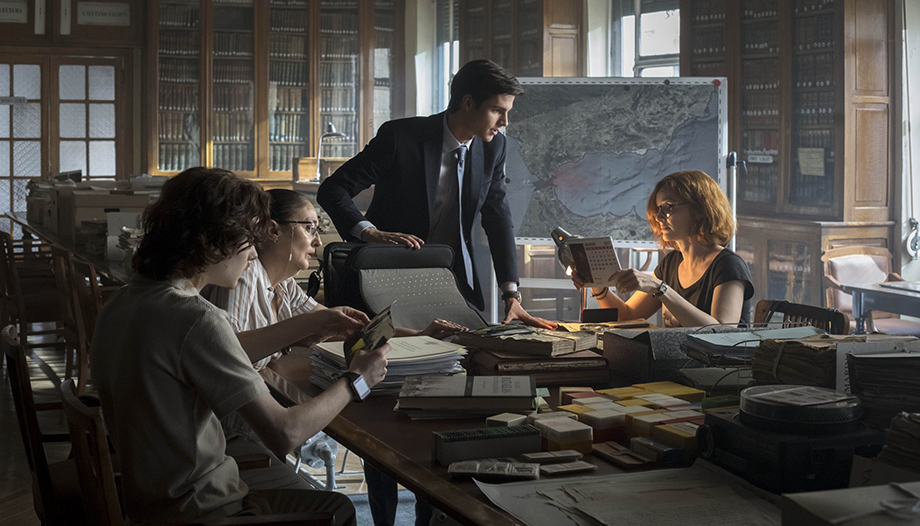I confess that I have been a fan of Alejandro Amenábar since my days as a student of Information Sciences. His opera prima Thesis (1996) saw the light of day while I was still in college and all of us classmates felt it was the work of one of our own (we shared a career with him) who had achieved what we all wanted and for which we were preparing ourselves: to communicate, to tell great stories.
My admiration for the Spanish-Chilean director, however, has suffered ups and downs due to his commitment to controversial themes in which he clashed with my approaches. For example, Offshore (2004), is an ode to the legalization of euthanasia; or Agora (2008), a historical film in which Christianity is portrayed as the enemy of progress and science.
His latest production, however, has reconciled me with him once again. It is the miniseries La Fortunaproduced by Movistar+ and advertised as the most expensive Spanish series in history. The script is based on the comic The treasure of the black swanby Guillermo Corral and Paco Roca, which in turn is based on real events. Specifically, on the victory of Spanish diplomacy against a North American treasure-hunting company that, in 2007, misappropriated the cargo of coins from the Spanish navy's galleon Nuestra Señora de las Mercedes, sunk in the 19th century.
The protagonists: a young conservative and Catholic diplomat and a more mature, progressive and atheist civil servant. Sparks fly from the very first moment between two characters whose only common ground is their desire to recover for Spain the plundered treasure. The series combines action and adventure films, espionage, period battles, romance, legal thriller, all the components to keep a wide range of viewers glued to the screen. However, I have been surprised that it has passed without much fanfare (I don't know its audience figures, but its echo in social networks is quite limited) and that it has not been well treated by critics.
And the fact is that La Fortuna is a friendly, conciliatory product. It does not favor either of the two Spains represented by Alex Ventura (Álvaro Mel) and Lucía Vallarta (Ana Polvorosa). The two protagonists manage to overcome all the barriers that divide them and they do it by walking together, diving into their common past, their cultural heritage, their historical roots. And that, sadly, does not deserve the attention today that the division, confrontation or gratuitous violence of the South Korean mollusk series does!
It is an American, lawyer Jonas Pierce (Clarke Peters), who makes the protagonists and the lazy members of the Spanish government realize the importance of uniting to recover the treasure, stating: "We are talking about more than money. We are talking about the cultural heritage of a country. Every sunken ship is part of your heritage, of your soul".
And what is the soul of Spain? Who are we in common? As soon as we reflect a little on our spirit as a nation, even as a continent, the subject of faith comes up.
The atheist Amenábar also achieves in La Fortuna, something that is rarely seen in the Spanish audiovisual industry in the last 60 years: respectfully portraying the religious fact. The scene takes place in the fourth chapter and is filmed in the church of San Marcos in Madrid. The young protagonist declares himself a Catholic, although far from the Church: "when I was a child," he says, "I went to the Piarists (Amenábar's autobiographical wink) and prayed a lot". He goes to the majestic temple in the midst of a personal crisis and there he has an interesting dialogue with an ordinary priest, like those we know who frequent churches, without caricaturing as we are accustomed to those who do not set foot in them. And the dialogue is sensible, realistic, hopeful, sublime".
In this scene and in the half dozen chapters of the series, I see Amenábar with his hand outstretched, ready to walk together, to overcome what separates us, to respect differences... Just what the Church is trying to do with its synodal process. Will we be able to take the hand of Álex, of Lucía, of so many and so many who are far from the Church and begin to walk together?
Let us not be satisfied with a Church majestically sunk in the depths where many pirates prefer to take advantage of it, and let us bring out the great treasure that we have to put in value. That is our soul; that is our Fortune. If we succeed, we will be fortunate or, which is the same thing, blessed.
Journalist. Graduate in Communication Sciences and Bachelor in Religious Sciences. He works in the Diocesan Delegation of Media in Malaga. His numerous "threads" on Twitter about faith and daily life have a great popularity.











